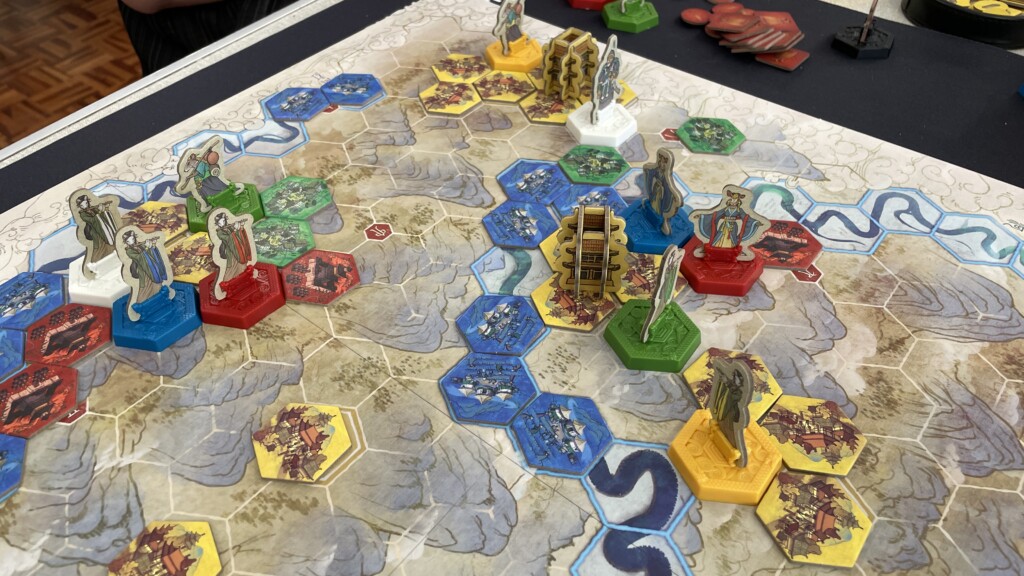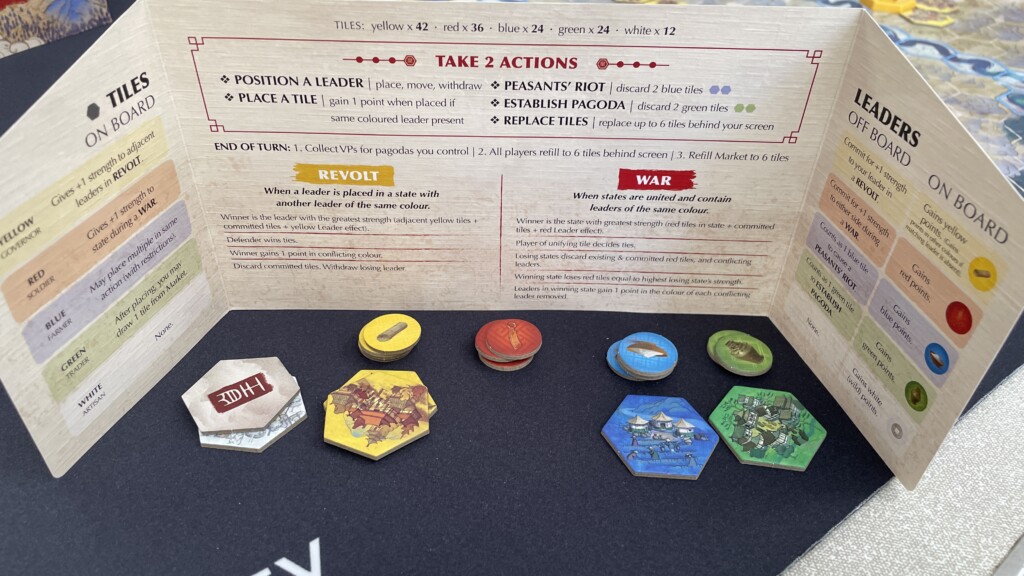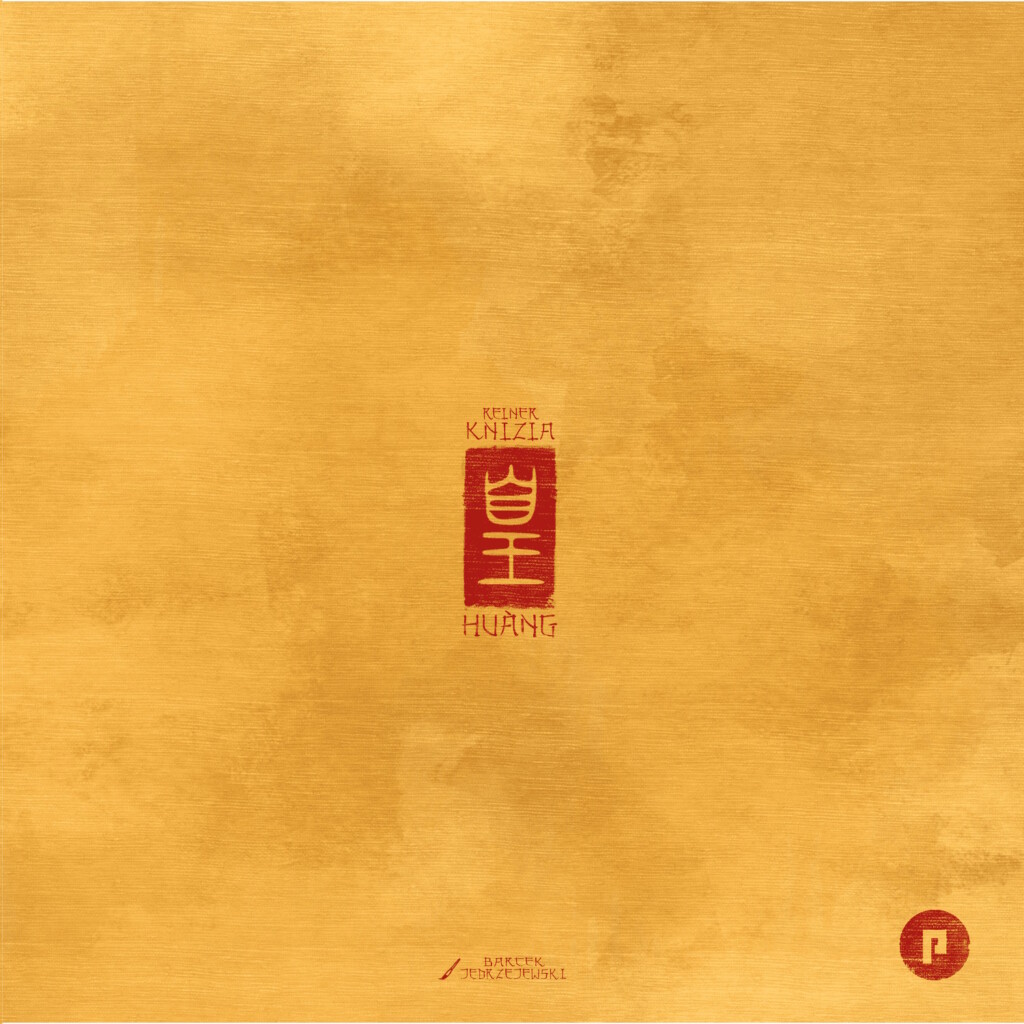HUANG has players playing tiles to build states to gain points in various colours.
Can you keep your various Leaders in place to do it? Or will they lose out to War and Revolt?
Lead an ancient China kingdom dreaming of imperial power, establish new states, build pagodas, strive for influence – and battle to unite the country under your glorious dynasty! HUANG is set in the Warring States period (475-221 BC), a time of endless wars between seven rival states: Qin, Chu, Qi, Yan, Han, Wei, and Zhao.
HUANG Game Overview
Quick Rules Summary
OK, so I’m just going to do a quick top-level overview with the key elements.
Players take turns taking 2 actions, they are to:
Place, move or withdraw one of their Leaders to or from the board. They must be placed or moved adjacent to a yellow tile.
Place a tile next to a Leader or another tile to expand the State. Score points for that colour tile if placed into a State with your Leader of the same colour.
If a Leader is placed into a State with an opponent’s Leader of the same colour we have a revolt. The Leaders reveal any yellow tiles they wish from behind their screen and add them to the number of yellow tiles adjacent to the Leader. The higher player wins and gains a point in the Leader’s colour and the losing Leader is withdrawn.
If a tile is placed to connect two States and those states have Leaders of the same colour a war starts. Players with Leaders on either side of the war can discard red tiles and add their collective adjacent red tiles to their Leaders. The losing Leaders are withdrawn and the winners gain a point in each warring Leaders colours.
How do you win?
When the bag that you draw tiles from is empty the game ends.
Apart from gaining points as shown above (and a couple of other ways), you can gain points from Pagodas. If you make a set of 3 tiles, place a Pagoda of the tile colour on it. If you control it by having the matching colour Leader in that State you gain a point of that colour at the end of your turn.
At the end of the game, you score the number of points you have that is the lowest of the 4 colour points you can earn, the most points wins.

Main Mechanisms
Tile placement is the main one here obviously. There is a tiny bit of hand management and a fair bit of area majority as you try and keep your Leaders in the States.
Theme
The theme might be based on history? But, the Leaders are animals so while it might be based on something historic it’s been twisted to borderline fantasy.
Setup
Easy, remove some tiles from the bag according to the player count I believe and that’s that.
Components & Artwork
Everything is nice. The tiles and plastic bases on the standees are pretty decent. The artwork is minimal and really nice. However, there is a deluxe edition with minis that is really nice.
The screen does a really good job of keeping you up to date with what’s what.

Ease of Teaching
The game is fairly easy to teach thanks to the great info dump on the back of the player screen. Helping players understand the difference between a revolt and a war helps a lot.
Similar Games
HUANG is a redo of Tigris & Euphrates which I have played and Yellow & Yangtze which I have not.
According to the players around the table who have played those more than me, this is just as good but more streamlined with a few additional elements to help with tile drawing randomness.
HUANG Review
Positives
The turns are very quick, especially those without a War or Revolt which is most of them.
Scoring is fun as you constantly score points on most turns so you feel like you’re progressing.
The game looks really nice on the table but since seeing the Deluxe version at UKGE I’d want that one…
Negatives
…partially because the 2D standees are hard for everyone around the table to see.
It’s a bit mean with players constantly trying to take things from you.
It can be difficult to understand the outcomes of gameplay.
Summary
A very fun game I think about a lot and I may pick up the game, if I can get the deluxe edition at the right price.
Jesta ThaRogue



Leave a Reply